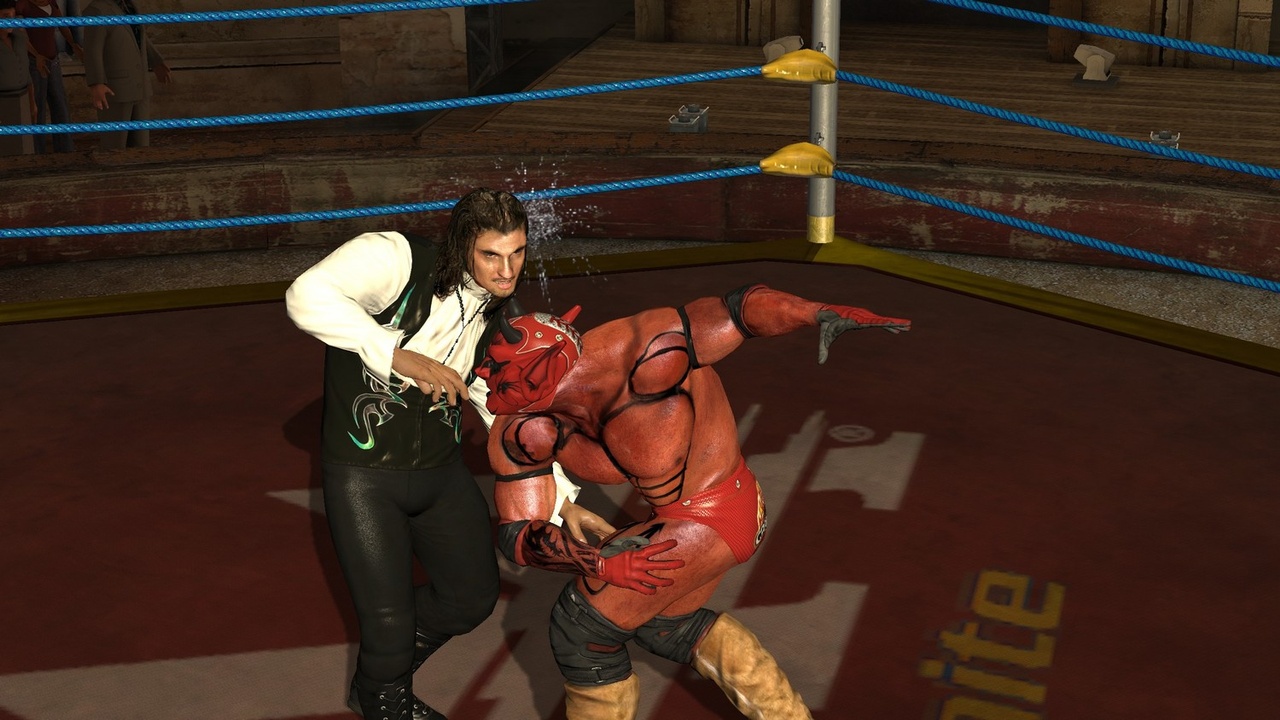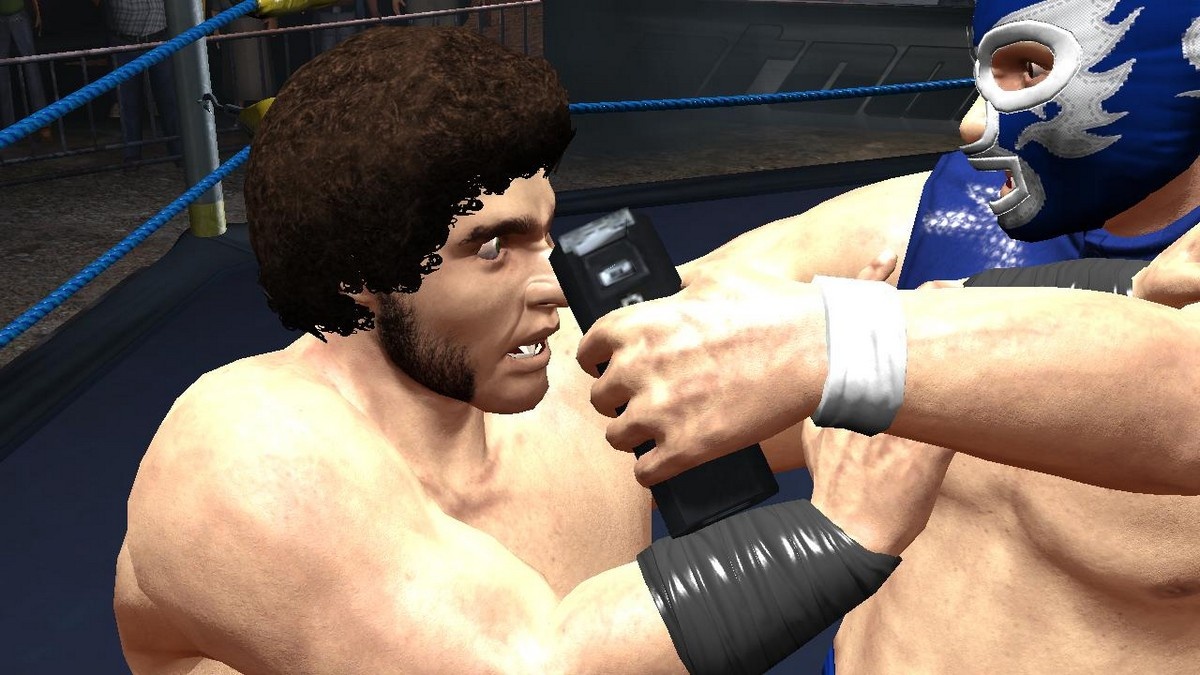Take a theatrical sport whose contestants look like cosplayers who went berserk at the Anime Expo, and it would seem like you have an effortlessly winning game concept on your hands. Until Lucha Libre AAA: Heroes del Ring, however, Mexico's colorful and popular lucha libre style of wrestling largely went ignored by game developers, save for 2006's pitiful Nacho Libre for the DS and notable cameo appearances such as El Fuerte in last year's Street Fighter IV. In short, somewhere out there a significant niche audience has waited a long time for something like this. Sadly, despite the game's impressive visual performance, spotty controls and a sparsely populated multiplayer mode unmask Lucha Libre as a flawed challenger in the ring of wrestling game dominance.
That's not to say it doesn't know its audience. Heroes del Ring features 31 of the most famous AAA luchadores donning the mask in Mexico today, ranging from the new incarnation of the famed skeleton La Parka to the legendary Gran Apache. These luchadores are divided into the Tecnicos (faces) and the Rudos (heels), providing fodder for an overblown story mode that occasionally makes WWE seem like Shakespeare. If you choose to play as a Tecnico, you spend the game as a promising rookie who tears through every Rudo in an attempt to find out who stole La Parka's championship belt; as a Rudo, you search for the belt among the Rudos in an effort to claim the title for yourself. It's fun stuff, and Heroes del Ring adds a dose of visual excitement by having you fight some matches as one of the other 31 luchadores.
Through all of this, Lucha Libre rings true with a distinctly Mexican audio and visual experience, ranging from the mellow Santana-inspired instrumentals of the cutscenes to intro music that mixes rock and mariachi. The surrounding crowd heckles and cheers in Spanish, and there's a desirable option to switch the announcers' voice-overs to the luchadores' native tongue as well. For one, English seems terribly inappropriate for the melodrama of lucha libre, and the switch to Spanish goes a long way toward capturing the energy of a televised match. Furthermore, since the announcers have a limited script in both languages that quickly grows annoying, an unfamiliarity with Spanish actually becomes a plus should you play with Spanish audio. Visually, the luchadores themselves are exquisitely detailed and instantly recognizable by any fan of the sport, and the available arenas project a distinctly Mexican ambiance, ranging from an extravagant shrine to the Virgin Mary in the corner of one arena, to an ancient Aztec setting in another. Heroes del Ring is a great-looking game, and even secondary elements such as the fans in the background receive attention to detail.
Sadly, these commendable elements can't save Heroes del Ring from the many blows it suffers in the ring itself. Watch any televised match of lucha libre (or, better yet, see one in person), and you'll see that the action never stops. Costumed luchadores brazenly leap from the ropes like electrically charged Mayan supermen at every possible opportunity, and combatants rarely get a chance to get their bearings before the next punch flies from their opponents' fists. Not so here. Lucha Libre's luchadores grunt and lumber about like movie dinosaurs from the 1950s, giving a sense of improbable mass reminiscent of Zangief in Street Fighter II. Where's the speed? Worse yet, in crowded matches involving more than two players, you grow used to inconsistent animations as rival luchadores unrealistically about-face within a split second and trap you in their grasp. This is especially conspicuous in the inferior PlayStation 3 version, which is subject to fairly frequent lockups beginning as early as the loading screen and comes complete with controls that occasionally seem slightly less responsive than those of its Xbox 360 cousin. While the transitions between cutscenes and action are generally fluid, and the graphics seem smoother and even more detailed on the Xbox 360, both versions are subject to the same infuriatingly poor controls.

Even so, the animations induce a few satisfying winces on occasion, whether through the head-crushing pile drivers or the slap of bodies as one luchador flies through the ropes at another, although the sounds of clashing chairs and beams against your opponent's back are strangely muted. And it's not at all difficult to pull off the flashier moves, provided you can get used to the game's frustratingly bumpy timing. Lucha Libre follows the simple grapple-and-block formula of early wrestling games, and every character controls in the same way but has different animations. At its best, this ensures that you can play every character you unlock with ease; at its worst, it ensures that the gameplay quickly becomes repetitive and boring. As a general strategy, you wear down your rival with weak grapples and other hits, all the while decreasing his popularity with the crowd while increasing your own. This is crucial, since some moves and pins can't be properly executed without the right amount of popularity, no matter how battered your opponent is. By filling up your popularity bar with taunts and successful grapples and counters, however, you have a chance to unleash a devastating finishing attack that destroys your rival's popularity, often meaning all the difference in the outcome of a fight.
It's a good idea in theory, but the sluggish controls hamper it in practice. As mentioned earlier, your opponent's AI frequently makes sudden and unrealistic transitions that catch you unawares. Success is thus less dependent on watching the character animations than it is on looking for the countering prompt that pops up above your character's head right before your opponent attempts a grapple. And even then you might fail, owing to the game's curious predilection for not registering hits or counters. Time and time again, you find your opponent slamming you down headfirst in a grapple you were sure you started. Opportunities to jump safely out of the ring sometimes result in your luchador looking dumbly at the ropes while you mash the proper command and your opponent slams you down again. Issues such as these frequently force you to win matches against multiple luchadores by keeping them out of the ring until the timer runs out. When they do catch you, be prepared to mash even more buttons. After you're slammed to the mat by an opponent or caught in a lock, breaking free depends on mashing down the specified button as quickly as possible to the point that your fingers ache in harder modes. There's even a trophy for pressing one of these buttons 12 times in a second.
But at least you look cool. Nothing defines lucha libre (or "free fighting") in the popular mind quite like the outlandish masks that luchadores wear to their six-sided ring, and in this regard, Lucha Libre doesn't disappoint aside from an inexplicable limit of four character slots. The masks can be customized according to eyes, nose, mouth, and top and side accessories, along with a virtually infinite range of color options. The rest of your luchador is just as open to stylistic possibilities, with options including body build and accessories and more practical categories such as attributes and moves. With 51 options for facial tattoos alone, it's possible to spend several hours creating the perfect luchador, ensuring that Lucha Libre neatly avoids any worries that you'll come across other players who look exactly like you.
That is, if you can even find any other players. Multiplayer for both the Xbox 360 and the PS3 is dead only two weeks after the game's official release. It's a shame, really, since the multiplayer leaderboards largely focus on lucha libre's popular and theatrical mask-versus-hair challenges, which result in either the shaving or demasking of the loser. At the time of review, even the top ranked players don't appear to be fighting a great deal. And with the recent release of the eagerly anticipated WWE SmackDown vs. Raw 2011, Lucha Libre's online multiplayer may be pinned for good. Fortunately, Heroes del Ring has an offline Pride mode for quick play that offers the same fairly standard modes as the multiplayer, including one-versus-one, one-versus-two, two-versus-two, one-versus-three, three-way, or four-way. That's not a lot of options, but then again, AAA tournaments tend not to have the variation of their WWE counterparts anyway. Each of these is customizable, allowing you to set options such as handicaps, the type of referee you'll have, the chance of disqualification, and whether a win is earned by pin or submission.

Lucha Libre AAA: Heroes del Ring could have been an innovative and engaging experience, but it's actually a pale and merely passable thematic imitator of better wrestling games. Should developer Immersion have a chance to learn from its mistakes and inject its next game with a hefty dose of true lucha libre speed, a host of attack variations, and more-responsive controls, a sequel could easily make its mark in the WWE-dominated world of wrestling games. As it stands, however, Lucha Libre AAA: Heroes del Ring is a missed opportunity of the highest order.